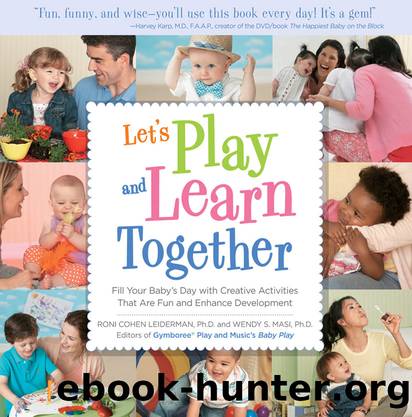Let's Play and Learn Together: Fill Your Baby's Day with Creative Activities that are Super Fun and Enhance Development by Roni Leiderman

Author:Roni Leiderman
Language: eng
Format: epub
Publisher: Fair Winds Press
Published: 2012-01-15T00:00:00+00:00
What Sinks? What Floats?: The bathtub becomes a place for discovery and learning when you introduce the concepts of sinking and floating. Have your child collect waterproof objects from around the house like spoons, plastic bowls, clean rocks, and a variety of toys. Let him guess what will sink and what will stay on the surface of the water before he puts them into his bathwater.
» Promotes discovery learning
A critically important, lifelong gift we give our children is how to get along with others. Making friends and demonstrating care and respect are paramount. This learning starts with their very first relationship with caring adults and then extends to the other important people in their lives. Babies, as young as three months old, are interested in watching people and are fascinated with other children. Toddlers squeal with joy when their favorite friends show up, and although they are still navigating interactions with other children, they are clearly developing the roots of friendship building.
Mastering social skills takes time and experience. Cooperation begins in infancy with the kinds of turn-taking games parents naturally do as they play with children: You roll the ball to baby, and she rolls it back. Your child playfully drops a toy and you pick it up. Baby offers you a bite of her cookie and you say, âThank you!â Through these simple experiences, children are learning the basics of social interchanges.
One of the hallmarks of making friends is the ability to empathize, or understand what another person is feeling. Toddlers can exhibit considerable empathy and adjust their behaviors in response to the feelings of other children and adults. You can see this when your toddler gives you a hug when you look sad or when she gives her baby doll a âbottle.â Because empathy is a skill that must be taught, it is critically important for adults to demonstrate acceptance, respect, and understanding toward others and model loving relationships.
Playing together is a developmental process. Toddlers tend to play happily next to friends but donât actually play with them. Preschoolers have more complex interactions. They delegate, share, determine themes, and build together. Some children take naturally to playing with others and enjoy the company of their peers while others find it much more difficult to accept new people. Sometimes itâs easier to play with another child on neutral territory where children do not have to feel possessive of their own toys. Meeting at a playground where children can run and climb together without worrying about sharing toys is often a great way to introduce new friends.
Ways to Facilitate Social Skills Development
Give your child the opportunity to interact with children of different ages.
Set up the environment so that play is fun and successful with age-appropriate toys.
Choose toys that encourage two children to play together.
Model the use of words to describe feelings, such as âI get sad when the pages are ripped out of the bookâ or âI feel so happy when you give me kisses.â
Encourage and model helping others for your child.
Download
This site does not store any files on its server. We only index and link to content provided by other sites. Please contact the content providers to delete copyright contents if any and email us, we'll remove relevant links or contents immediately.
Kylian Mbappe by Ed Hawkins(287)
Timelines of Science: From Fossils to Quantum Physics by Dorling Kindersley(223)
Merry Christmas by Uncle Amon(204)
Boy Like Me: A Searing YA Novel About Two Boys Finding Love in the Shadow of Section 28 by Simon James Green(196)
The Lion Storyteller Book of Animal Tales by Bob Hartman(189)
Every One Is Special: Cats by Fiona Munro(175)
The Shar-Wolf of New York City by Aleesah Darlison(167)
The Wheel of Life by Ellen Glasgow(166)
Let's Play and Learn Together: Fill Your Baby's Day with Creative Activities that are Super Fun and Enhance Development by Roni Leiderman(165)
Pony Jumpers: Box Set 2 (Volumes 5-8) by Kate Lattey(153)
Small Acts of Kindness by Caroline Day(152)
A Narrative of a Nine Months' Residence in New Zealand in 1827 by Augustus Earle(150)
Time-Out from Technology by Molly Wigand(147)
The Elemental Detectives by Patrice Lawrence(141)
A Kid's Guide to Keeping Family First by R. W. Alley(136)
Girl Under a Red Moon by Da Chen(131)
All About Horses by Molly Kolpin(130)
Sundance by Laura Holt-Haslam(129)
Power Up to Fight Pollution by Lisa Bullard(127)
